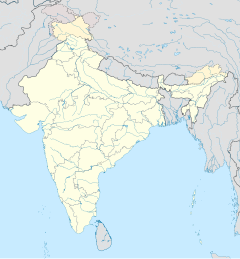Jantar Mantar, New Delhi
| Jantar Mantar | |
|---|---|
|
Native name Hindi: जंतर मंतर |
|

Misra Yantra at Jantar Mantar
|
|
| Type | Observatory |
| Location | New Delhi, India |
| Coordinates | 28°37′26″N 77°12′57″E / 28.624000°N 77.215938°E |
| Elevation | 220.6 meters |
| Founder | Maharaja Jai Singh II |
| Built | 1724 |
| Website | Official website |
Jantar Mantar is located in the modern city of New Delhi. It consists of 13 architectural astronomy instruments. The site is one of five built by Maharaja Jai Singh II of Jaipur, from 1723 onwards, as he was given by Mughal emperor Muhammad Shah the task of revising the calendar and astronomical tables. There is a plaque fixed on one of the structures in the Jantar Mantar observatory in New Delhi that was placed there in 1910 mistakenly dating the construction of the complex to the year 1710. Later research, though, suggests 1724 as the actual year of construction.
The primary purpose of the observatory was to compile astronomical tables, and to predict the times and movements of the sun, moon and planets. Some of these purposes nowadays would be classified as astronomy.
Completed in 1724, the Delhi Jantar Mantar had decayed considerably by 1867.
There are three instruments within the observatory of Jantar Mantar in New Delhi: the Samrat Yantra, the Jayaprakash, and the Misra Yantra.
Between 1727 and 1734 Jai Singh II built five similar observatories in west-central India, all known by the name Jantar Mantar. They are located at
While the purpose of the Jantar Mantars was astronomy and astrology (Jyotish), they are also a major tourist attraction and a significant monument of the history of astronomy.
West tower of Samrat Yantra
Center tower Samrat Yantra
East tower Samrat Yantra
Rama Yantra (North of the two Rama Yantras)
Inside view of Rama Yantra 2 of Jantar Mantar
Coordinates: 28°37′37.59″N 77°12′59.32″E / 28.6271083°N 77.2164778°E
...
Wikipedia


